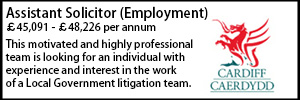Junior doctors win "significant victory" in rest breaks appeal
- Details
Junior doctors in Derby have won a 'precedent setting' Court of Appeal case over the monitoring of rest breaks.
Doctors’ union the British Medical Association (BMA), which supported the doctors involved, said the ruling was a “significant victory for junior doctors” and would set a precedent in England and Wales.
The dispute concerned software used by NHS trust to monitor doctors’ breaks, which the BMA said could be inaccurate.
Jeeves Wijesuriya, BMA junior doctors committee chair, said: “Today’s ruling is a victory for junior doctors and confirms that trusts or health boards have been using commercial software that has underestimated the hard work, long hours and inadequate rest faced by junior doctors for years.
“In overturning last year’s ruling, the Court of Appeal has established a binding precedent in England and Wales in favour of the BMA regarding how monitoring of junior doctors on the 2002 contract should be done.” He said it was important that trusts or health boards “do not run overly fatiguing or unsafe rotas”.
Yet the BMA said widespread use and incorrect application of monitoring software resulted in trusts failing to pick up issues with working conditions, and potentially weakened the protections afforded to junior doctors in their contracts.
Dr Wijesuriya said: “These protections were put in place because it is recognised that junior doctors working long hours, in a system under pressure, with no provision for even a short break will be left exhausted.
“Throughout this case the BMA has been clear that is it vitally important that working hours and the ability to take breaks are properly monitored, rotas are compliant, and sanctions enforced where trusts or health boards have not ensured that there are safe working practices in place.”
The University Hospitals of Derby and Burton NHS Foundation Trust said it understood the BMA viewed the issue as a test case, rather than one specifically targeting the trust and that the main point of contention was whether the algorithms in the Allocate software used properly monitor whether junior doctors were able to take their natural breaks.
Magnus Harrison, the trust’s executive medical director, said: “Patient safety is central to everything we do in our hospitals and we work hard to ensure excellent training, alongside a good work life balance, for our junior doctors. “However, this decision clearly has implications not only for the trust but other NHS employers.
“It is important that we reflect carefully on the judgment and whether it should be appealed. We are working closely with our legal representatives and relevant stakeholders and we will make a decision in due course.”











